

Teaching Methods. Parents Want Kids to Use Mobile Devices in Schools. Digital Tools Teaching Strategies Flickr: jhaymesisvip Smartphones, tablets, and other mobile devices have gained popularity as educational tools in part because of the belief those devices could cut across the digital divide created by socioeconomic boundaries.
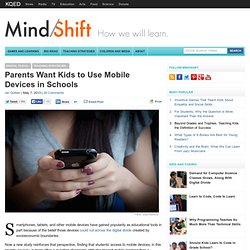
Now a new study reinforces that perspective, finding that students’ access to mobile devices, in this country anyway, is more often a question of parents’ attitudes toward mobile learning than a family’s income or the mobile device provisions of that family’s local school district. The report published by Grunwald Associates and the Learning First Alliance with support from AT&T, found that, according to data from a representative nationwide sample of nearly 2,400 parents, more than four in five K-12 students at least occasionally use some sort of computing device, including mobile devices like tablets or smartphones, or laptop computers.
Income did affect the number of computing devices per household, however. How Leadership Can Make or Break Classroom Innovation. The leaders of a school or school district play a big role in setting the culture and work environment for teachers.
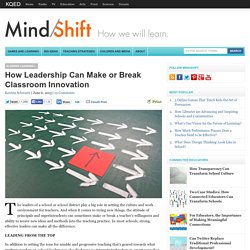
And when it comes to trying new things, the attitude of principals and superintendents can sometimes make or break a teacher’s willingness and ability to weave new ideas and methods into the teaching practice. In most schools, strong, effective leaders can make all the difference. In addition to setting the tone for nimble and progressive teaching that’s geared towards what students need most, school leaders can also find ways to integrate technology in smart ways that work on the same goals. And they can help to remove roadblocks when necessary. “A key leadership role is to try to build a shared vision for blended learning,” said Eric Williams, Superintendent York County School Division in Virginia.
The Obsolete Tech Director. The role of the typical school district technology director has become obsolete.
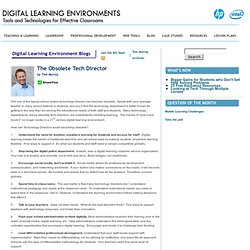
Speak with your average teacher in many school districts in America, and you’ll find the technology department is better known for getting in the way than for serving the educational needs of both staff and students. Many technology departments, led by obsolete tech directors, are inadvertently inhibiting learning. The mantra of ‘lock it and block it’ no longer works in a 21st century digital learning environment.
Leading Innovative Change Series – Learning First, Technology Second. I wanted to try my hand at writing a series of blog posts on “Leading Innovative Change”.
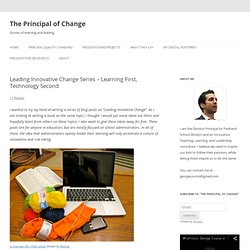
As I am looking at writing a book on the same topic, I thought I would put some ideas out there and hopefully learn from others on these topics. I also want to give these ideas away for free. These posts are for anyone in education, but are mostly focused on school administrators. In all of these, the idea that administrators openly model their learning will only accelerate a culture of innovation and risk taking. cc licensed ( BY ) flickr photo shared by Brenda Learning First, Technology Second “Freedom is actually a bigger game than power. A few years ago, our school district was strictly a “BlackBerry” environment for mobile devices. What Changed in Ten Years? I hit a moment this weekend where I wanted out of the urban public school environment.

It wasn't the kids. It wasn't the teachers. It wasn't the principal. It was the policies. "This is what you signed up for," a teacher told. 20 Substantive Questions Parents Should Ask Teachers. 20 Questions Parents Should Ask Teachers by Terry Heick Back-to-school content is usually focused on teachers and students, and as these two groups will have the largest workload ahead of them, that makes sense.

But for students, the ultimate support system is not an expert teacher, but an informed and supportive family. One of the most significant challenges facing formal education in the United States is the chasm separating schools and communities. Changing Our Classroom Stuff Is Not Enough. If you’re an educator and you’re even remotely connected through social media to your professional world, you know that there is a tremendous amount of dialogue back and forth about educational change.
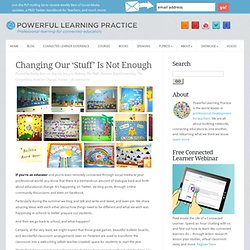
It’s happening on Twitter, via blog posts, through online community discussions and even on Facebook. Particularly during the summer we blog and talk and write and tweet, and even pin. We share amazing ideas with each other about how things need to be different and what we wish was happening in schools to better prepare our students. Do Something. I had the fantastic opportunity to attend the College of Alberta School Superintendents (CASS) Leadership Academy, this past weekend in Banff, Alberta.
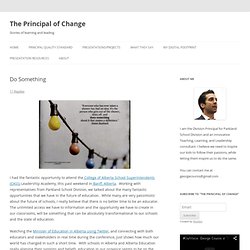
Working with representatives from Parkland School Division, we talked about the many fantastic opportunities that we have in the future of education. While many are very pessimistic about the future of schools, I really believe that there is no better time to be an educator. The unlimited access we have to information and the opportunity we have to create in our classrooms, will be something that can be absolutely transformational to our schools and the state of education. Watching the Minister of Education in Alberta using Twitter, and connecting with both educators and stakeholders in real time during the conference, just shows how much our world has changed in such a short time.